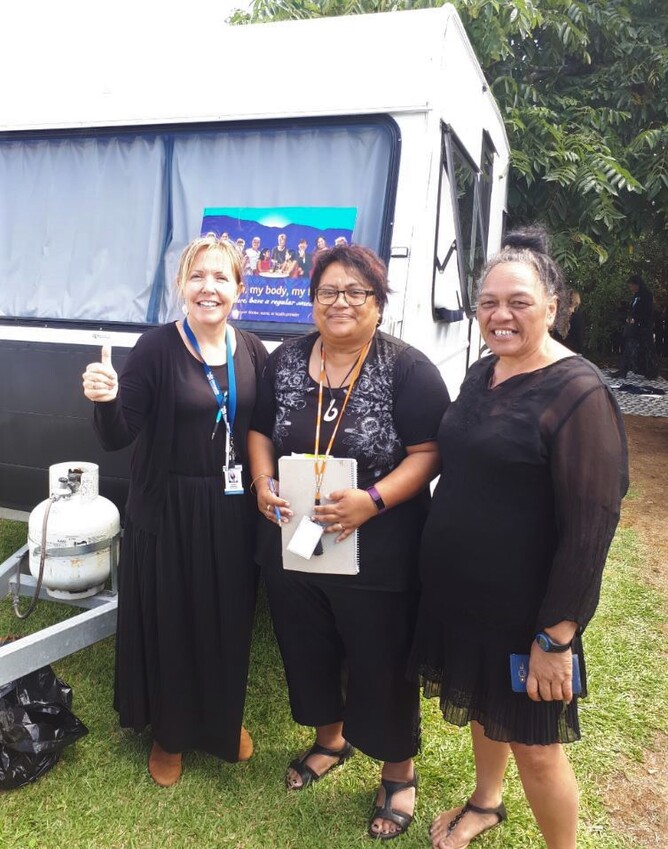Earlier this month, Pinnacle Midlands Health Network and Nga Miro Health Centre together attended five Waikato-based marae across five days during Poukai for the first time in the tradition's history, reaching hundreds of priority group women with cervical screening messages.
Poukai is a tradition dating back to the 19th century, where the marae affiliated to the Kīngitanga receive an annual circuit of visits by the king that includes feasting and cultural performances. This was the first year that a variety of health services, including Pinnacle's support to screening service, were present as part of the festivities.
Pinnacle's support to screening mobile health nurses, Cindy Tawa and Rachel Keightley, were invited to attend alongside breast and cervical health coordinator Deanna Rendall and whakapuukaha kaumatua programme coordinator Tau Hona from Nga Miro Health Centre. Nga Miro holds the relationship with Poukai coordinators. Cindy said the invitation presented a fantastic opportunity to promote cervical screening to those, statistically, who need it most.
"Māori women in the Waikato are considered cervical screening priority group women. These women, alongside Pacific Island Women and Asian women are statistically some of the most likely to be overdue for their screening, or are unscreened. We're very grateful for the opportunity to have been invited into a space where hundreds of Māori women and their whānau were present and we could talk to them about this important health service," she said.
"Our key message when speaking to whānau at the marae, alongisde Nga Miro, was that smears help to detect changes on the cervix. Early detection and treatment of these changes reduces the risk of cervical cancer. Ultimately, a smear can save your life, and most importantly, this is not a one off exercise. Women need to get it done and get it done regularly. Nga Miro also provided women with cervical screening handouts with more information about why to get screened and how."
The Nga Miro and Pinnacle representatives not only had the chance to speak with dozens of women and their whānau about the importance of screening, they also provided cervical smears on site - discretely in a fit-for-purpose screening caravan - to eight attending women.
Deanna said one of the key benefits of being at Poukai was the chance to mingle with women and whānau "in their own space" where they could talk through solutions to any fears, embarrassment, bad experiences, lack of transport, working long hours and other concerns.
"Cervical smears and related education commonly takes place in a clinic. Poukai was a chance to be on various marae where our audience was comfortable and felt at-home. Those we spoke to were really enthusiastic and inquisitive. We even had men interested and asking us questions. The feedback from attendees exceeded our expectations," she said.
Rachel said the face to face contact was particularly important. "Being at the coal face with more than 150 women at each of the five marae was incredibly valuable. We got to step through the screening process in plain English, address reasons why smears are important and remove the fears so that women are more likely to attend screening."
"It's speaking to people face to face makes a huge difference. You can find out why they're avoiding their cervical smear and walk them through all the options available to them. Being among these women at Poukai, with Nga Miro, was an opportunity we loved and hope to grasp for many years to come. Ultimately, we hope to see an improvement in uptake of smears among priority group women because of the positive word of mouth."
More about Pinnacle's support to screening service
- The Pinnacle MHN service works to provide cervical and breast screening to priority group women.
- For cervical screening, priority group women are Maori, Pacific or Asian women aged 20-69 years old, or any woman between 30-69 years old who hasn't had a cervical smear in the previous five years, or has never had a cervical smear.
- These women are referred to the service after practices and community providers have made multiple attempts to contact them
- For cervical screening specifically, the service's mobile health nurses contact the women and arrange for screening to take place in the women's own home or otherwise supports the women to get to their general practice.
- Nga Miro Health Centre is contracted to Pinnacle as one of its support to screening providers.
PICTURED ABOVE: Pinnacle's Rachel Keightly and Nga Miro's Deanna Rendall and Tau Hona at Poukai
